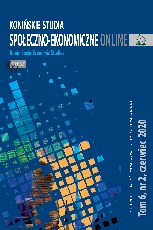Emotional accessibility of perpetrators of domestic abuse
and sense of security in the context of sexual l1if e
Emotional accessibility of perpetrators of domestic abuse
and sense of security in the context of sexual l1if e
Author(s): Jakub Bartoszewski, Krzysztof Kowalik, Bożena Miastkowska, Karolina SmagajSubject(s): Social Sciences, Psychology, Sociology
Published by: Akademia Nauk Stosowanych w Koninie
Keywords: family abuse; perpetrators; emotional states; narrative; sex life; sense of security; self-assessment; control; penitentiary system
Summary/Abstract: The study reported in this paper deals with the issue of self-assessment of thesexual life of offenders convicted of a crime involving use of domestic violence(Polish Penal Code, §207), accounting for the role of emotional accessibility asan element of the sense of security. The study was conducted on a group ofmale subjects (N-35). The study used descriptive statistics to demonstrate thecorrelations between narrative, a sense of security, and self-assessment ofconvicts. This paper draws attention to deep connections and the interconnectednessof these three elements. A sense of security turns out to be oneof the most crucial reasons for being imprisoned for domestic violence. Unfortunately,the prison environment does not weaken but strengthens a senseof security. Moreover, it does not enable prisoners to express their personalityand makes them take a specific game imposed by the prison environment.This is reflected in the autonarration of emotional inaccessibility. Emotionaldetachment leads to aggression as well as socially unacceptable sexual acts.In consequence violence offenders show an alarmingly lasting impact of suchbehavior which, after serving a prison sentence, reveals itself as an inabilityto build relationships, especially sexual ones. Furthermore, these dysfunctionsemerge not only on the level of psyche but also on the physiological levelwhich makes the therapy even more difficult and complicated. The study conductedfor the purpose of this paper blatantly confirms complex correlationsbetween control, self-control and the level of emotions. This paper also drawsattention to the unreliability of the Polish penitentiary system which, as oneof the forms of penalization, unjustifiably, uses the separateness of the prisonerfrom meeting their psychological, emotional and physiological needs.
Journal: Konińskie Studia Społeczno-Ekonomiczne
- Issue Year: 7/2021
- Issue No: 2
- Page Range: 137-153
- Page Count: 137
- Language: English

